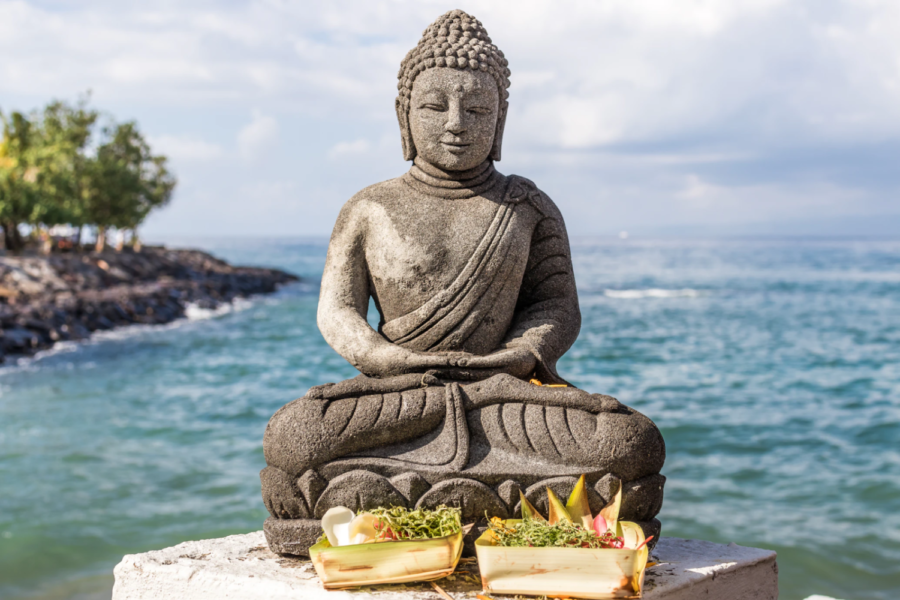The Singer and Songwriter Lana Del Rey on Buddhism: What Does it Mean to be Free?
A synthesis of enlightenment philosophy can be seen in Buddhist lore and in Lana Del Rey’s lyrics.
What does it mean to be free? It’s a question that has stumped humans for centuries. Ingrained in all political and cultural movements is an attempt to answer the inquiry. True freedom, enlightenment – it’s a sensation we all search for.
Socially stunted and in my bed, it was the winter of 2020, and my ninth grade year was on a computer, due to the Coronavirus pandemic. I was on my phone, practically an extension of my hand by now. And for lack of any better ideas, I had scrolled deep into my Tiktok “for you page,” eventually to arrive on an edit of the Lana Del Rey music video ‘Ride.’
User “strawb3rry.angell” had commented under the edit, “this will forever be the best Lana song I’ve listened to. I think it’s just the lyrics and how much it helps express what I can’t put into words.” I decided to take a look, and for the first time in a while, I got a taste of true freedom.
The music video is ten minutes long, five of which consists of a monologue. And Lana Del Rey’s words hit hard. Motor bikes, tire swings, and empty city streets: these images instantly embody that of a free spirit as they zip across a screen. With the pairing of visual and audio, I was overcome with a feeling of free-ness.
Living an enlightened life, the idea is credited to the Buddhists. They see enlightenment as a state of being, one that is to be awakened in only the most perfected individuals. The achievement is considered a “perfect freedom.” They have fully realized the meaning of life, and thus are not beholden to any sort of social construct. Enlightenment is true freedom.
The first to achieve enlightenment was the founder of the religion, Buddha himself. Raised Siddhartha Gautama, he grew up in the wealthy Brahman caste, accustomed to a lifetime of luxury. He was an overachiever who had developed an incredible curiosity for philosophy and meaning. Quickly, he outgrew the teachings of the Brahmans, and hit the road. He began a grand journey, with his sights set on enlightenment.
Over his journey, Siddhartha slowly lost everything. He lost his wealth, lost his family, lost his home, and lost his best friend. He found himself truly alone. He was detached from all except his persistent search for meaning. Roaming the island of Bodh Gaya, and distraught, he finally confessed to himself, “I do not want to…dissect myself any longer…I want to get to know myself, the secret of Siddhartha.” He entered a fateful meditation, and awakened to a new world.
“If you want to fly, give up everything that weighs you down,” Buddha famously said.
Fully detached from every person, place, possession, idea, Siddhartha was free. And for me, I was reading his story from a PDF. Siddhartha achieved true freedom, and I was sitting in my 7th period English class, as required.
Slightly jealous, I continued with Siddhartha on his enlightened journey. He had now woken from his meditation, and was starstruck by nature. A childlike wonder had consumed him; every experience felt fresh and new. He no longer looked for meaning in the world, he just let it soak in.
“If you are quiet enough, you will hear the flow of the universe. You will feel its rhythm. Go with this flow. Happiness lies ahead,” said Siddhartha. This, he defined as true freedom.
“Go with the flow.” That’s a hard idea to pin down. But it was enough to make me look up from my PDF.
With my eyes hazy from reading, with one quick rub of my eyes, I was brought back to that moment in my bed during my ninth grade year. Watching the Lana Del Rey’s ‘Ride’ music video, her line struck me, “We have nothing to lose… except to make our lives into a work of art.”
Make our lives a work of art. I rehearsed this line for a while, and as I did, I envisioned Siddhartha in nature. I saw him become enraptured with its beauty, and with the rhythm of the world. The image felt freeing; seeing it felt like art.
Every moment, as Siddhartha frames it, is like a piece of art. He appreciates every waking second.
The religion of Buddhism describes enlightenment as a pretty far out achievement, reserved only for the most perfected beings. And as a lifestyle, this makes sense. To constantly appreciate every conscious moment, and isolate yourself from every material attachment, it is not only a sparsely accepted ethos, but a generally unappealing one at that.
Maybe not everyone is ‘The Enlightened One,’ but an enlightened mindset is universal.
But to achieve this – the enlightened mindset – one must appreciate romance, the rhythm and flow of the world, and the cinematic poetry that brings it to life. A person must stop dissecting their senses for meaning, but just embrace them in their purest form. Romance is a bond. It ties living beings to nature. Live to notice the connections, and live to soak it all in.
Romance is a cryptic idea, but within it lies freedom.
“If you are quiet enough, you will hear the flow of the universe. You will feel its rhythm. Go with this flow. Happiness lies ahead,” said Siddhartha.
Yasmine Salha is an Editor-in-Chief for ‘The Science Survey.’ She is a proponent of accessible journalism, and loves to simplify complex and controversial...

